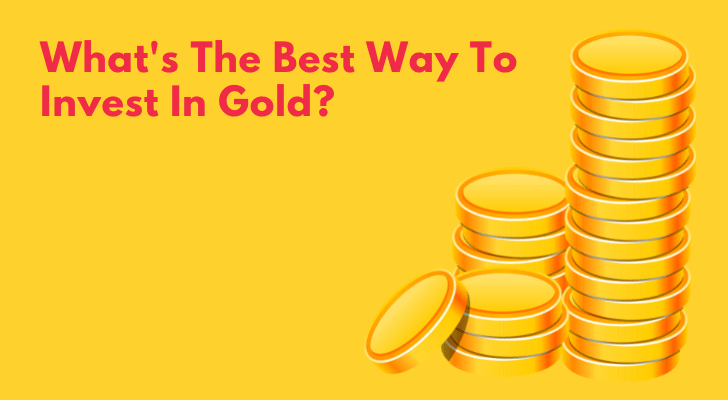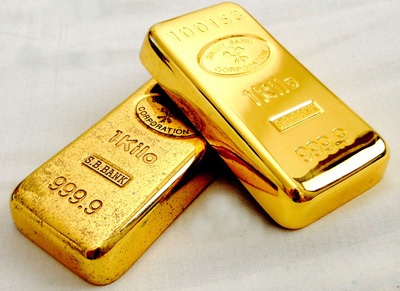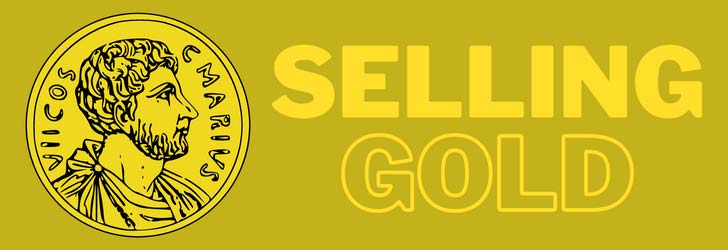The value of gold as a commodity has always remained relatively stable but has seen a significant increase in the past few years. With the whole economical volatility, gold has been increasingly viewed as a viable investment option. Is it actually good as a means of securing your finance? If so, what’s the best way to invest in gold? Let’s explore and decide whether or not it's a smart move.

The Different Ways to Invest in Gold
Own Physical Gold
The most common method is to purchase gold coins, bullion, or bars. This is a very safe and secure way to invest, as long as it’s stored in a safe place.
If you're looking for a tangible asset that you can hold in your hand, then purchasing physical gold bullion or coins is the way to go. Gold bullion bars and coins offer investors the most liquidity and flexibility when it comes to selling or trading their investments. However, storage and insurance costs can add up over time.
Invest In Gold Stocks
Another popular method is to invest in gold stocks or mutual funds. This involves buying shares of companies that are involved in the gold industry.
For those looking for high returns, investing in gold mining stocks may be the way to go. Gold mining stocks tend to be much more volatile than other types of investments, but they can offer investors the potential for significant gains. However, these types of investments are also much riskier and should only be considered by investors who are willing to take on a high degree of risk.
Gold through Exchange Traded Funds
Gold can also be purchased through Exchange Traded Funds (ETFs). These are investments that track the price of gold without having actually to own any physical gold. ETFs are a good option for those who want to invest in gold without having to worry about storage or safety concerns.
Gold ETFs and mutual funds are a more convenient way to invest in gold, as they can be easily bought and sold on major stock exchanges. These types of investments also tend to be less volatile than physical gold or gold mining stocks. However, they do not offer investors the same level of control over their investment as owning physical gold does.
Gold via Future Contracts
You can also invest in gold futures contracts. These are agreements to buy or sell gold at a set price at a future date. Futures contracts are riskier than other types of investments, but can also offer high rewards if the price of gold goes up.
Advantages and Disadvantages of Investing in Gold

While there are pros and cons to investing in gold, it is generally considered a safe investment option with the potential for high returns.
Pros of Investing in Gold
Throughout history, gold has been used as money, jewellery, architecture, etc. Gold is also abundant in nature, making it a relatively easy commodity to mine and process. The value of gold tends to be stable or increase over time, making it a good investment for those looking to protect their wealth or grow their savings. Gold is also highly liquid, meaning it can be easily bought and sold without affecting its value.
- Diversify your portfolio: Gold is not correlated with other asset classes such as stocks and bonds, so it can help diversify your portfolio and reduce overall risk.
- Wealth protection: Gold is a tangible asset that holds its value well during times of economic turmoil.
- Inflation hedge: Gold typically goes up in value when inflation rises.
- Relatively safe investment: Gold prices have historically been very stable, and even during times of economic turmoil, gold prices have held steady or even increased. This makes gold a good option for investors who are looking for a safe place to invest their money.
- Potential for high returns: While the price of gold can fluctuate in the short term, over the long term, the price of gold has trended upwards. This means that investors who buy gold and hold onto it for a long period of time are likely to see significant profits.
Cons of Investing in Gold
Gold is a finite resource. There's only so much gold in the ground, and once it's all mined, that's it. That means the supply of gold will be limited, and demand for gold will increase faster than supply. Then what will happen? Will the price of gold shoot up? Not necessarily. The technology may come up to recycling gold left on the earth. We just don’t know what will happen in the long term, and the uncertainty is one of the cons.
- High initial investment: You need a large amount of money to invest in gold.
- Gold does not produce income: Unlike stocks or bonds, gold doesn't pay dividends or interest. That means you're not earning anything on your investment while you wait for prices to go up.
- Safe haven status: Gold is often seen as a safe haven asset, which means people tend to buy it during times of economic uncertainty. This can drive up the price and make it more volatile (although relatively stable.)
- Storage and insurance costs: If you buy gold bars or coins, as a physical asset, you will need to store it safely and insure it against loss or theft.
How to Get Started Investing in Gold
However, investing in gold can be a relatively simple process, and it can be an effective way to diversify your portfolio and protect your wealth. Here are a few tips to get you started:
1. Decide what type of gold you want to invest in.
Each option has its own advantages and disadvantages, so it's important to do your research before deciding which option is right for you.
2. Determine your investment budget.
Again, there are no hard and fast rules here. It all depends on your individual circumstances, budget, and your investment goals. A general rule of thumb is to allocate 5-10% of your portfolio to gold, but ultimately the decision is up to you.
3. Choose a reputable dealer.
Possibly the most important step is this one. There are many unscrupulous dealers out there who will try to take advantage of inexperienced investors. So, it's important to choose a dealer that is well-established and has a good reputation.
4. Open an account and make your purchase.

Once you've chosen a dealer, you'll need to open an account with them and make your purchase. Be sure to keep track of all documentation related to your purchase, including receipts, invoices, and shipping information.
5. Store your gold safely.
If you're buying physical gold, you'll need to store it somewhere safe. A home safe or bank safety deposit box are both good options. If you're buying gold ETFs or mining stocks, they can be stored in your brokerage account.
When is the Best Time to Sell Gold?
Knowing when to sell a gold investment is just as important as knowing when to buy it. It is essential to understand the market conditions in order to maximize the return on your investment and ensure that you are making sound decisions. When it comes to selling gold, timing is everything.
Gold prices are constantly fluctuating, so it's important to keep an eye on the market and sell when the time is right.
The things to consider when trying to determine the best time to sell gold are:
- The current gold price: Check online or in newspapers to see what the current price of gold is. This will give you an idea of whether or not now is a good time to sell.
- The type of gold you have: Some types of gold are worth more than others. For example, coins or jewelry made with 24-karat gold will be worth more than those made with 14-karat gold.
- The condition of your gold: If your gold is in good condition, it will be worth more than if it's damaged or worn.
- Your personal circumstances: Ultimately, the best time to sell gold is when it's most convenient for you. If you need the money right away, it may be better to sell sooner rather than later.
What to do Before You Sell Gold

When it comes to gold investments, there are a few things you should do before you sell. First, take a look at the current market conditions. Have gold prices been rising or falling? If they have been falling, you may want to wait to sell until they start to rise again.
Second, consider the fees you will have to pay to sell your gold. These can include broker fees, commission fees, and other charges. Make sure you know what these fees will be so you can factor them into your decision of when to sell.
Finally, think about why you are selling your gold. Is it to generate cash for another investment? To diversify your portfolio? To take advantage of current market conditions? Knowing your reasons for selling will help you make the best decision for when to sell your gold investment.
Getting the Most Out of Your Gold
When you are ready to sell your gold investment, you want to get the best price possible. There are a few things you can do to make sure you get the best price for your gold.
- Know what the current market price of gold is and compare it to what you paid for your gold. This will give you an idea of how much profit you can expect to make from selling your gold.
- There are a lot of different buyers of gold, so check around to find the one who is willing to pay the most for your gold.
- Be prepared to negotiate. Don't be afraid to negotiate with buyers in order to get the best price for your gold.
- Consider the fees and commissions. When you sell your gold, there will likely be some fees and commissions associated with the transaction. Make sure to factor these into your calculations when determining the best price for your gold.
Conclusion
There is no one-size-fits-all answer to this question, as the best way to invest in gold will vary depending on your individual circumstances and goals. However, we hope that this article has given you some food for thought and helped you to understand a bit more about investing in gold. If you're thinking about adding gold to your investment portfolio, be sure to do your research and speak with a financial advisor to get the most informed advice.
